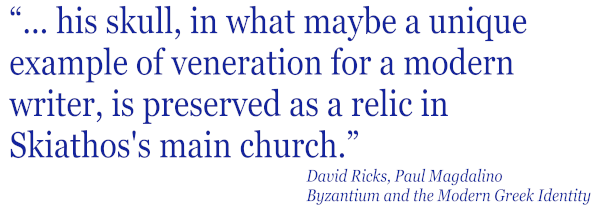
Submitted by Gregg Baldwin on Wed, 05/05/2021 - 13:56
The forthcoming seminar in the series Greek Dialogues Online celebrates the publication of Volume Two of the translation series Alexandros Papadiamandis, The Boundless Garden: Selected Short Stories, edited by Lambros Kamperidis and Denise Harvey. Details of the series can be found on the publisher’s website: https://deniseharveypublisher.gr/books/boundless-garden-volume-ii. To accompany the seminar, we reproduce here an extract from Lambros Kamperidis's introduction to "The Boundless Garden: Selected Short Stories, Volume I" edited by Denise Harvey & Lambros Kamperidis.
Alexandros Papadiamantis (1851-1911) is considered the most important literary figure of nineteenth-century Greece and possibly of modern Greek literature to date. Born on Skiathos in the western Aegean, he remained an islander at heart, even when working and living in Athens, and died on the island of his birth having returned there later in life. His writing has had a profound influence in Greece, touching, as it does, on issues of Greek identity and highlighting tensions that exist at the margins of cultural divergence: east versus west, past versus present, island versus mainland, affluence versus poverty. His work is suffused with human passions and delves into the turbulence of emotional turmoil with unflinching explorations of the darker aspects of Greek life and culture as he experienced and analysed them.
In the first volume of "The Boundless Garden," Kamperidis wrote:
"The short stories of Alexandros Papadiamandis are graced with an almost indefinable quality common to all great writers. This quality would seem to derive from an enthralment combined with a certain perplexity, an irresistible pull exerted by the author’s descriptions of a world of beauty and marvels which at the same time is filled with predicaments, human tragedies and humble triumphs. Like his contemporaries in the great European tradition of story-telling, Papadiamandis explores the souls of men and women as they succumb to or struggle against the power of evil—the Raskolnikovs, the Uriah Heeps and the Kareninas—people living on the edge of man’s capacity to deal with evil and who are tragically driven, by an irrational process, to the extremes of human vulnerability.
Papadiamandis knew this European tradition intimately, learning his craft while translating many of the major authors of his time—Dostoyevsky, Chekhov, de Maupassant and Alphonse Daudet—as well as some of the minor literary figures, including Bram Stoker, Hall Caine, Bret Harte, Georges Ohnet, [1] and although he himself objected to it, he was even compared by some of his contemporaries to Edgar Allan Poe and Charles Dickens, most likely because of the tragic tenor of his work and his habit of marking Christmas and Easter by turning out a seasonal story. His literary field of reference, however, extended far beyond the nineteenth century and along with Homer, Plato and Hesiod he also drew on Dante and Shakespeare, easily integrating scenes and passages from their works into his writing.
Papadiamandis lived in the midst of an uncertain age of transition. Born in the middle of the nineteenth century (1851) in a period of post-Enlightenment turmoil and a generation after Greece’s War of Independence, his reflections on and observations of Greek life in both his native island of Skiathos and in urban Athens continue, almost a century after his death, to define the modern Greek experience in a way unattained by any of his now forgotten contemporaries.
The century that separates today’s reader from the world of Papadiamandis has brought a radical transformation in the political, social and religious landscape of the world he describes. This complex landscape has undergone so many changes during the past hundred years that the way people inhabited it and related to one another, the objects that surrounded them, the animals and inanimate things that defined it—all of which he describes so compellingly—have utterly disappeared or have been transformed out of all recognition. These changes inevitably influence the way we view his world, a world which no longer exists. The attentive reader will realize, however, that this is not solely due to a temporal distance: Papadiamandis himself was also alienated from the literary and religious establishment of his day. Several of his stories reveal his rejection of the conventional assumptions of his time concerning events such as the liberation of Greece from the Turks, the reign of the Bavarian regent, Otho, the ideological alignment with the West, the revival of the Olympic Games, or social idées reçues such as the position of unmarried women.
Nevertheless one cannot simply assert that Papadiamandis was as much misunderstood and misinterpreted in his day as he appears to have been in our times. In recent years, he has acquired both enthusiasts and detractors, each group of critics focusing on its own area of interest, dividing, as it were, the seamless garment of his work into reductive, conflicting pieces, none of which fit or do justice to the whole fabric of his vision. Separated from the whole, each becomes a caricature. He has been claimed by the religious establishment as one of their own, hailed by the social ethnographers as a natural if instinctive folklorist, decried by the Greek modernists as a reactionary, and remains a scandal to both sides of the purist versus the demotic language question. [2] Papadiamandis resists all such easy or narrow classifications...." (Lambros Kamperidis in The Boundless Garden: Selected Short Stories, Volume I (2007)).
Alexandros Papadiamandis: Between Greek Heritage and Modernity? is the first event associated with the Cambridge-Stockholm Collaborative Research Grant (2020-2023) Greece between Europe and Asia: regionality, religion and culture. The Grant is designed by co-PIs Tim Whitmarsh (Faculty of Classics, Cambridge), Elizabeth Key Fowden (Faculty of Classics, Cambridge) and Arja Karivieri (Department of Archaeology and Classical Studies, Stockholm) to bring together scholars with a broad diachronic interest in the Hellenic world – Prehistoric, Classical, Byzantine, Ottoman, Modern – to participate in several workshops and events. The collaboration’s diachronic approach reaches beyond the borders of the modern nation-state of Greece to reconsider the subtle entanglements of language, religion, and locality across Greek-speaking environments.


